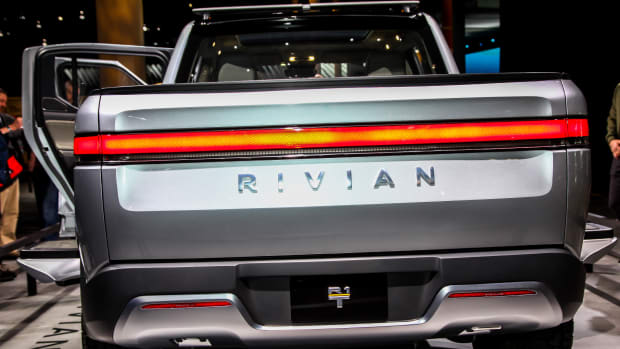
George Soros symbolizes the loyal shareholder of the EV upstart Rivian.
He was burned by the stock market rout of the firm based in Irvine, Calif., but at the same time he continues to believe in the future of Rivian, considered one of the most serious rivals of Tesla and Elon Musk.
Yet the numbers are stubborn.
In mid-November 2021, just days after a spectacular IPO on Nov. 10, the electric vehicle manufacturing startup, backed at the time by Amazon (AMZN), would see its market value reach $150 billion. The market cap is currently $12.36 billion.
Rivian (RIVN), like other EV upstarts, is burning a lot of cash ramping up production. As a result, it cannot afford to lower its prices to compete with Tesla, because its production costs remain huge and its profit margins are already very narrow. The price war was launched by Tesla, which has lowered the prices of its vehicles six times this year.

Shutterstock
Tough Landscape
Consumers are also facing a credit crunch due to the Federal Reserve's inflation-fighting interest-rate increases. This policy makes car loans more expensive. Average interest rates for new-car loans went from 4.4% in February 2022 to 7% in February 2023, according to Edmunds.com. Average interest rates for used-car loans went from 7.8% in February 2022 to 11.3% in February 2023.
Rivian vehicles also no longer benefit from the federal tax credit of $7,500 granted to clean vehicles. One of the main reasons is that the U.S. Treasury Department requires that, for an EV to qualify for the full credit, a significant percentage of the key minerals that go into its battery must be extracted or processed in the U.S. and more than half of the battery manufacturing and component assembly must take place domestically as well.
Rivian thus is confronted with this simple reality: Its R1T pickup truck is base-priced at $73,000, compared with $59,974 for the Ford F-150 Lightning, its direct competitor.
For consumers concerned about saving money in this period of uncertainty, the choice seems simple. What could help save Rivian would be if the delivery times were long at Ford, because the demand for the F-150 Lightning is very high. But at the same time, Rivian is struggling to increase its own production rates.
Tesla's Cybertruck, another serious competitor, should also arrive on the market in the third quarter, at a price not yet determined. That could complicate things even more for Rivian.
Faced with this outlook, Soros has reduced his losses considerably. He gradually sold his shares every quarter last year. This year is no exception to this cut-loss strategy. During the first quarter ending March 31, Soros, through his hedge fund, Soros Fund Management, sold 10.77 million Rivian shares, or 75% of his stake, holding on to 3.58 million shares. The reduced stake was worth $55.4 million on March 31, but has lost further value, as Rivian's stock price is down 16.6% since the end of the quarter. Soros' position is currently valued at $46.2 million.
Soros Acquires Call Options
Still, Soros continues to believe that Rivian has potential. The legendary corporate raider has taken a new, less risky position by acquiring 1 million call options, meaning that he has the right to purchase Rivian shares at a locked-in price sometime in the future.
These call options suggest that he is convinced that Rivian's stock will rebound, but at the same time he does not want to take on more risk by putting in extra money. Still, for Soros, there is an upside to Rivian.
If he is wrong, he will only lose his premium, letting the call options expire.
Rivian was one of the few EV Upstarts to confirm its vehicle production forecast this year. The group, which plans to produce 50,000 vehicles -- a little more than double the 2022 number -- also reduced its losses in the first quarter.
The company recorded a gross operating loss of $535 million compared to the $752 million that analysts expected. In the first quarter of 2022, the loss was $502 million.
Revenues amounted to $661 million in the first quarter, mainly because of the delivery of 7,946 vehicles. The company produced 9,395 vehicles during the first quarter. Rivian also significantly reduced costs: total operating expenses fell to $898 million, compared to $1.07 billion in the first quarter of 2022.
But the group warned that the supply chain remained a headache.
"We continue to believe the supply chain will continue to be the main limiting factor of our Normal facility output," the carmaker warned. "Our team continues to work on the introduction of new engineering design changes and key technologies which will take effect during the second half of 2023 to help mitigate anticipated supply chain constraints."
Soros's Portfolio
Stock market regulations require managers of funds with more than $100 million in US equities to file a document, known as a 13F, within 45 days of the end of the quarter, to disclose their holdings in stocks that trade on US exchanges.
The value of Soros' US equity portfolio decreased by almost 11% quarter-over-quarter to $6.5 billion. Soros Fund Management is a family office that manages public and private equity.
"SFM invests globally in a wide range of strategies and asset classes, including public equities, fixed income, commodities, foreign exchange, alternative assets and private equity," the firm says on its website.
Soros, whose net worth is estimated at $8.5 billion as of May 13, according to the Bloomberg Billionaires Index, is well known for pouring money into philanthropic efforts. Most of his firm's assets belong to Open Society Foundations, which supports "people across the world who work for justice, equity and free expression."







